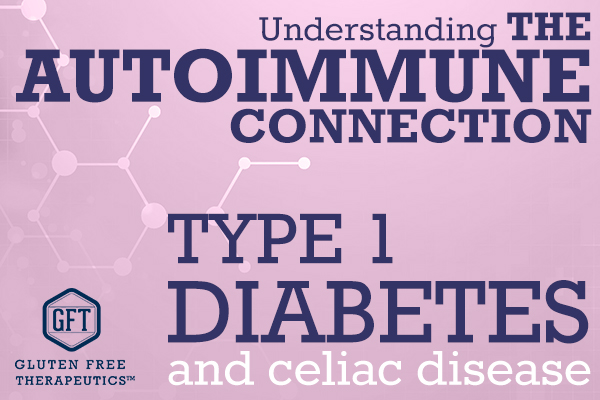
Does Gluten Trigger Type 1 Diabetes?
The Link Between Celiac Disease and Type 1 Diabetes
Type 1 diabetes is a chronic, lifelong condition that occurs because the body does not produce enough insulin, resulting in high levels of sugar in the blood. Like celiac disease, type 1 diabetes is immune-mediated¹, which means the body’s immune system mistakenly destroys healthy tissue. In celiac disease, the immune system attacks the lining of the small intestine, while in type 1 diabetes, it destroys the pancreatic cells responsible for producing insulin.
The genetic link between celiac disease and type 1 diabetes² has been well established, with studies showing that between 3.5 percent and 10 percent of celiac patients also have type 1 diabetes. What’s more, following a promising result in laboratory mice, an increasing number of researchers are testing the hypothesis that gluten may trigger type 1 diabetes³.
Unlike type 2 diabetes which typically occurs later in life, most often in response to significant weight gain, trauma, stress or aging, type 1 diabetes commonly presents in childhood but can also develop later in life. Type 1 diabetics must use insulin injections to help maintain a healthy balance of blood sugar and insulin and avoid side effects that can include coma and even death.
Like celiac patients, type 1 diabetics must follow strict dietary guidelines in order to help avoid problems with blood sugar levels. When patients have both conditions, planning meals that include all necessary nutrients becomes problematic. What’s more, because celiac disease affects the body’s ability to absorb nutrients, nutrition can become even more compromised.
For this reason, many people who have both celiac disease and type 1 diabetes turn to dietary supplements to ensure they get the nutrition they need to stay healthy. Because of the risk of gluten contamination present in mass-produced supplements and even many specialty nutritional products, choosing supplements designed specifically for celiac patients is critical.
CeliVites supplements by Gluten Free Therapeutics were developed specifically to meet the nutritional deficiencies of celiac patients. As the mother of an adult child with celiac disease, company President Leigh Reynolds understands the critical importance of proper nutrition.
“We developed our supplements using the purest, most readily absorbable forms of nutrients to ensure patients get the nutritional support they need to stay as healthy as possible,” Reynolds says. “We have a personal connection to these diseases as do many of our customers. We are pleased to tell our customers about this link between celiac disease and type 1 diabetes.”
To learn more about CeliVites and to see the complete line of Gluten Free Therapeutics supplements and nutritional products, visit the company website or follow GFT on Facebook or Twitter. And to learn more about Type 1 diabetes, visit the websites of the American Diabetes Association and Kidshealth, operated by the Nemours Foundation.
¹Pugliese, A. (2014) Advances in the Etiology and Mechanisms of Type 1 Diabetes. Discov Med.18:141-50.
²Smyth, D.J. et al. (2008) Shared and Distinct Genetic Variants in Type 1 Diabetes and Celiac Disease. N Engl J Med. 359:2767-2777.
³Antvorskov, J.C. et al. ( 2014) Dietary gluten and the development of type 1 diabetes. Diabetologia.;57(9):1770-80
This original article is made possible by Gluten Free Therapeutics. Our mission is to educate, inform, and provide the most effective nutritional products possible to allow those with celiac disease and serious gluten intolerances to heal their bodies. CeliVites complete line of superior gluten free supplements includes multivitamin/multimineral supplements, iron supplements, and calcium supplements for people living with celiac disease. All CeliVites products are designed to help you heal, restore and rebuild your body, because going gluten free isn’t enough!
Comments ()















